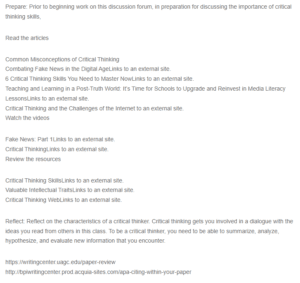Elements of Critical Thinking
According to Heard et al. (2020), critical thinking is the analysis of issues based on relevant evidence and facts while avoiding the influence of personal opinions, feelings, and emotions. The elements of critical thinking include identification, which refers to having a clear picture of the issue at hand and the factors that influence it to figure out the potential solutions. The next element is research, which involves drawing a persuasive argument based on valid scholarly sources. Another vital component of critical thinking is identifying biases, which involves comparing available points of view on the subject matter and then drawing judgment based on the legitimacy of those presenting a viewpoint. The fourth element is inferencing, which refers to drawing a conclusion based on the available data. Next is determining relevance, which involves determining the most important information worth consideration. Finally, there is curiosity, which involves asking why things happen the way they do, and this may be attained by asking open-ended questions.
Bhargava’s (2006) book on global issues shows the application of critical thinking skills to decipher the problems that affect the world today. From the outset, the author identifies the issues that affect the world, including climate change, poverty, disappearing fisheries, terrorism, and financial scarcity, among others. To that end, he declares that such issues require every citizen’s input. Consequently, the author draws relevant data from reliable institutions like the United Nations (UN), the International Monetary Fund (IMF), and the World Bank. These institutions have relevant data relating to the topic under investigation. The author derives potential solutions to the problems at hand based on the available data.
On the other hand, the World Economic Forum article on Forbes lacks elements vital critical thinking elements. Although the article identifies key global issues such as climate change and global diseases, the author fails to draw comparisons with reliable data sources. Bailin et al. (1999) aver that comparison is vital for one to derive critical thought since it allows one to compare different viewpoints and decide which one makes the most sense. Also, the article’s authors fail to infer the sources from which they acquired information on global issues.
References
Bailin, S., Case, R., Coombs, J. R., & Daniels, L. B. (1999). Common misconceptions of critical thinking. Journal of Curriculum Studies, 31(3), 269–283. https://doi.org/10.1080/002202799183124
Heard, J., Scoular, C., Duckworth, D., Ramalingam, D., Teo, I., & Australian Council For Educational Research (Acer. (2020). Critical Thinking: Skill Development Framework. Australian Council For Educational Research (Acer.
Vinay Kumar Bhargava. (2006). Global issues for global citizens: an introduction to key development challenges. World Bank.
World Economic Forum. (2023, January 9). 3 Ways Leaders Can Tackle Global Issues In A Fragmented World. Forbes. https://www.forbes.com/sites/worldeconomicforum/2023/01/06/3-ways-leaders-can-tackle-global-issues-in-a-fragmented-world/?sh=50ca2ec2576d
ORDER A PLAGIARISM-FREE PAPER HERE
We’ll write everything from scratch
Question

Elements of Critical Thinking
Prepare: Prior to beginning work on this discussion forum, in preparation for discussing the importance of critical thinking skills,
Read the articles
Common Misconceptions of Critical Thinking
Combating Fake News in the Digital AgeLinks to an external site.
6 Critical Thinking Skills You Need to Master NowLinks to an external site.
Teaching and Learning in a Post-Truth World: It’s Time for Schools to Upgrade and Reinvest in Media Literacy LessonsLinks to an external site.
Critical Thinking and the Challenges of the Internet to an external site.
Watch the videos
Fake News: Part 1Links to an external site.
Critical ThinkingLinks to an external site.
Review the resources
Critical Thinking SkillsLinks to an external site.
Valuable Intellectual TraitsLinks to an external site.
Critical Thinking WebLinks to an external site.
Reflect: Reflect on the characteristics of a critical thinker. Critical thinking gets you involved in a dialogue with the ideas you read from others in this class. To be a critical thinker, you need to be able to summarize, analyze, hypothesize, and evaluate new information that you encounter.
https://writingcenter.uagc.edu/paper-review
http://bpiwritingcenter.prod.acquia-sites.com/apa-citing-within-your-paper

